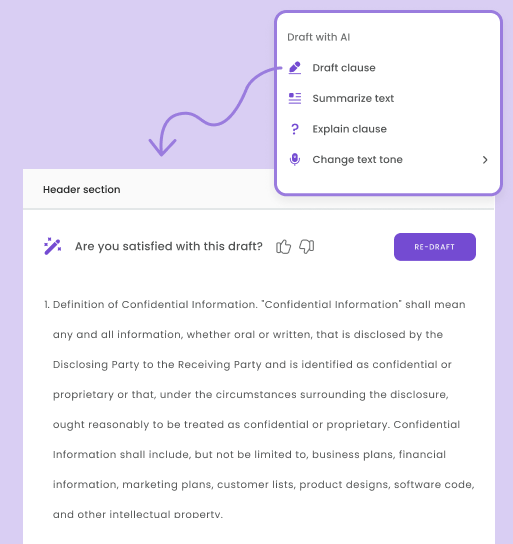There are many types of contracts for you to take advantage of. Some of them offer explicit protections and others are ambiguous. Ideally, you want an express contract because it’s one of the strongest types of contracts you can use.
In this guide, you’ll learn what express contracts are, the most important parts, the different types of express contracts, and much more.
Understanding Express Contracts
An express contract is a legally binding agreement in which the parties involved clearly and explicitly state their intentions, terms, and conditions either in writing or verbally. These contracts are formed when the parties directly communicate their agreement and reach a mutual understanding of the terms. Express contracts leave no room for ambiguity since the terms are explicitly articulated and agreed upon by the parties involved. This is the most common type of agreement between businesses and goes a long way towards mitigating risks.
Express Contracts vs Implied Contracts:
- Formation: Express contracts are formed when parties specifically discuss and agree on terms, while implied contracts arise from the conduct or circumstances of the parties.
- Clarity: Express contracts are clear and unambiguous due to the explicit statement of terms, whereas implied contracts may involve inferred terms based on the parties’ behavior.
- Communication: Express contracts require direct communication of terms, while implied contracts may arise from a lack of objection to certain actions or situations.
- Proof: Proving the existence of an express contract is usually straightforward since the terms are explicitly stated, while proving an implied contract may require demonstrating the parties’ actions and intentions.
Examples of Scenarios Where Express Contracts are Prevalent:
- Real Estate Transactions: When individuals buy or sell property, they often enter into express contracts detailing the terms of the sale, including the purchase price, property description, and closing date. If there are any clauses missing in this kind of transaction, it may prevent the eventual signing of the agreement.
- Employment Agreements: Employment contracts that outline job responsibilities, compensation, benefits, and other terms are express contracts.
- Service Agreements: Contracts between service providers and clients, such as software development agreements or consulting contracts, are usually express contracts. With that being said, there are also many implied best practices associated with the contract.
- Sales of Goods: When businesses sell goods to consumers, the terms of the sale, including the product specifications, price, and delivery date, are often laid out in express contracts.
- Lease Agreements: Rental agreements for property, vehicles, or equipment are express contracts that define the terms of the lease.
- Construction Contracts: Contracts between contractors, subcontractors, and clients detailing the scope of work, payment terms, and project timeline are express contracts.
Express contracts are important because they provide clarity and certainty regarding the rights and obligations of the parties involved. Since the terms are explicitly stated, they serve as a valuable reference in case of disputes or misunderstandings.
Key Elements of Express Contracts
Express contracts, due to their nature, have the elements of a valid contract built in. These include the following key factors.
Clear Offer and Acceptance:
An express contract begins with a clear offer made by one party and the subsequent acceptance of that offer by the other party. The offer should be specific and unambiguous, outlining the terms, conditions, and expectations of the contract.
Both parties must demonstrate their mutual agreement and assent to the terms of the contract. This can be achieved through clear communication and a shared understanding of the terms.
Specific Terms and Conditions:
Express contracts must outline the obligations and responsibilities of each party involved. This ensures that both parties understand what is expected of them and prevents misunderstandings.
The contract should specify payment terms, including amounts and due dates, as well as the timeline for completing tasks or delivering goods and services. These details are crucial for both parties’ expectations.
Legal Intention:
For an express contract to be valid, both parties must intend for the contract to have legal consequences. The agreement should not be a casual conversation or a mere expression of future intentions. That’s why it’s more common for express contracts to be written. It’s easier to prove legal intention.
Express contracts require a serious intent to create a legal obligation. Social conversations or preliminary discussions typically do not hold the legal weight of an express contract. Those are a part of the negotiation process before the express contract is drafted and comes into effect.
Consideration:
Consideration refers to something of value (such as money, goods, services, or promises) exchanged between the parties as part of the contract. Each party must provide something valuable in return for the promises made in the contract.
Consideration is essential for the enforceability of the contract. It demonstrates that both parties have entered into the agreement with a sense of commitment.
These key elements collectively ensure that an express contract is valid, binding, and enforceable under the law. Each element plays a crucial role in clarifying the rights and obligations of the parties and reducing the likelihood of disputes.
Types of Express Contracts
Written Contracts:
As the name implies, written contracts are express contracts that are formalized through a written document. This document serves as evidence of the parties’ agreement and clearly outlines the terms, conditions, rights, and obligations of each party.
Many written contracts are deemed legally enforceable once they are signed by the parties involved. The signature signifies the parties’ consent and agreement to the terms.
Oral Contracts:
Oral contracts are express contracts formed through spoken communication rather than a written document. Despite the absence of a written record, these contracts can be legally binding if the terms are clear and both parties mutually agree. These are less common than written express contracts.
One of the main challenges with oral contracts is the difficulty of proving their existence in court. Without a written document, it can be challenging to provide evidence of the terms and mutual agreement, which can lead to disputes and uncertainty.
It’s important to note that the validity and enforceability of both written and oral express contracts depend on the jurisdiction and applicable laws. Some contracts, like those involving real estate or certain large transactions, might be required to be in writing to be legally enforceable. Other contracts, especially those with complex terms, are often put in writing to avoid misunderstandings.
Advantages of Utilizing Express Contracts
Clarity and Certainty:
Express contracts clearly outline the terms, obligations, and expectations of each party. This transparency minimizes the chances of misunderstandings or misinterpretations.
Because express contracts provide a comprehensive and unambiguous description of the agreement, they help prevent disputes that can arise from vague or unclear terms.
Legal Enforceability:
Express contracts, especially written ones, are easier to enforce in court because they have clearly defined terms. This reduces the need for interpretation and increases the likelihood of a court ruling in favor of the contract’s terms.
In case of disputes, express contracts provide concrete evidence of the terms and conditions agreed upon. This evidence can be crucial in establishing the parties’ intentions and obligations.
Efficient Documentation:
Express contracts facilitate the process of creating agreements since the terms are explicitly stated. You can negotiate and finalize terms more efficiently compared to the potentially prolonged negotiations that can occur in other types of contracts.
When parties have a clear understanding of the terms, negotiation, and agreement can be expedited. This is particularly beneficial for time-sensitive transactions.
Utilizing express contracts offers numerous benefits, particularly in terms of reducing legal risks, enhancing communication between parties, and ensuring that the parties’ intentions are legally binding. These advantages are especially valuable in commercial transactions, employment relationships, and various other contexts where certainty and enforceability are essential.
Crafting Effective Express Contracts
Precise Language:
- Using Clear, Understandable Terms: Express contracts should be drafted using language that is easily understood by all parties involved. Avoid using technical jargon or language that could lead to confusion or misinterpretation.
- Avoiding Vague or Overly Complex Language: Ambiguous terms or overly complex language can lead to disputes or confusion down the line. Strive for simplicity while maintaining accuracy.
Comprehensive Coverage:
- Anticipating Potential Scenarios and Addressing Them in the Contract: Effective express contracts should cover various scenarios that might arise during the course of the agreement. By addressing these scenarios upfront, you can prevent disagreements and reduce the need for additional agreements.
- Minimizing the Need for Amendments or Supplemental Agreements: Well-crafted express contracts should be thorough in their coverage, reducing the need for frequent amendments or supplemental agreements. This streamlines the contract management process.
Seeking Legal Advice:
- Consulting Legal Experts for Complex or High-Stakes Contracts: For contracts involving complex terms, significant financial implications, or legal intricacies, it’s advisable to seek the guidance of legal professionals. They can help ensure that your contract is legally sound and aligned with best practices.
- Ensuring Compliance with Applicable Laws and Regulations: Legal advisors can help you navigate the regulatory landscape and ensure that your contract complies with relevant laws, regulations, and industry standards.
Crafting effective express contracts is crucial to establishing clear expectations, minimizing risks, and fostering a positive working relationship between parties. By following these guidelines, you can create contracts that serve as valuable tools for maintaining transparency and legal accountability.
Conclusion
Before reading this guide, you may not have realized how common express contracts are. They’re essential in business settings and are often used to prevent ambiguity.
They tick all the boxes of a valid contract and ensure that the interests of you and the other party are protected. Follow the tips in this guide to ensure your express contract holds up to scrutiny.
Let me know what you think in the comments and if you’re looking to automate your document creation, be sure to take a look at DoxFlowy.




